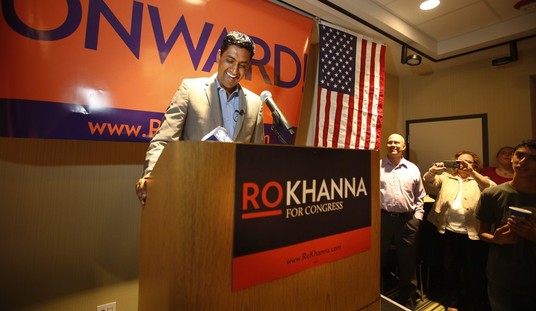Thanks to Scott Johnson at Power Line, we have Attorney General Eric Holder’s explanation of his decision to try Khalid Sheikh Mohammed in federal court rather than by military tribunals or commissions. Or do we? As Scott and Paul Mirengoff note, Eric Holder spends a lot of time in which he claims to explain the decision, and says nothing at all about how he reached it.
I am a prosecutor, and as a prosecutor my top priority was simply to select the venue where the government will have the greatest opportunity to present the strongest case in the best forum.
I studied this issue extensively. I consulted the Secretary of Defense. I heard from prosecutors from my Department and from the Defense Department’s Office of Military Commissions. I spoke to victims on both sides of the question. I asked a lot of questions and weighed every alternative. And at the end of the day, it was clear to me that the venue in which we are most likely to obtain justice for the American people is in federal court.
I know there are members of this committee, and members of the public, who have strong feelings on both sides. There are some who disagree with the decision to try the alleged Cole bomber and several others in a military commission, just as there are some who disagree with prosecuting the 9/11 plotters in federal court. …
This was a tough call, and reasonable people can disagree with my conclusion that these individuals should be tried in federal court rather than a military commission.
The 9/11 attacks were both an act of war and a violation of our federal criminal law, and they could have been prosecuted in either federal courts or military commissions. Courts and commissions are both essential tools in our fight against terrorism.
Therefore, at the outset of my review of these cases, I had no preconceived views as to the merits of either venue, and in fact on the same day that I sent these five defendants to federal court, I referred five others to be tried in military commissions. I am a prosecutor, and as a prosecutor my top priority was simply to select the venue where the government will have the greatest opportunity to present the strongest case in the best forum.
I studied this issue extensively. I consulted the Secretary of Defense. I heard from prosecutors from my Department and from the Defense Department’s Office of Military Commissions. I spoke to victims on both sides of the question. I asked a lot of questions and weighed every alternative. And at the end of the day, it was clear to me that the venue in which we are most likely to obtain justice for the American people is in federal court.
I know there are members of this committee, and members of the public, who have strong feelings on both sides. There are some who disagree with the decision to try the alleged Cole bomber and several others in a military commission, just as there are some who disagree with prosecuting the 9/11 plotters in federal court.
Despite these disagreements, I hope we can have an open, honest, and informed discussion about that decision today, and as part of that discussion, I would like to clear up some of the misinformation that I have seen since Friday.
First, we know that we can prosecute terrorists in our federal courts safely and securely because we have been doing it for years. There are more than 300 convicted international and domestic terrorists currently in Bureau of Prisons custody, including those responsible for the 1993 World Trade Center bombing and the attacks on our embassies in Africa. Our courts have a long history of handling these cases, and no district has a longer history than the Southern District of New York in Manhattan. I have talked to Mayor Bloomberg of New York, and both he and the Police Commissioner Ray Kelly believe that we can safely hold these trials in New York.
Second, we can protect classified material during trial. The Classified Information Procedures Act, or CIPA, establishes strict rules and procedures for the use of classified information at trial, and we have used it to protect classified information in a range of terrorism cases. In fact, the standards recently adopted by Congress to govern the use of classified information in military commissions are derived from the very CIPA rules that we use in federal court.
Third, Khalid Sheikh Mohammed will have no more of a platform to spew his hateful ideology in federal court than he would have in military commissions. Before the commissions last year, he declared the proceedings an “inquisition,” condemned his own attorneys and our Constitution, and professed his desire to become a martyr. Those proceedings were heavily covered in the media, yet few complained at the time that his rants threatened the fabric of our democracy.
Judges in federal court have firm control over the conduct of defendants and other participants in their courtrooms, and when the 9/11 conspirators are brought to trial, I have every confidence that the presiding judge will ensure appropriate decorum. And if KSM makes the same statements he made in his military commission proceedings, I have every confidence the nation and the world will see him for the coward he is. I’m not scared of what KSM will have to say at trial – and no one else needs to be either.
Fourth, there is nothing common about the treatment the alleged 9/11 conspirators will receive. In fact, I expect to direct prosecutors to seek the ultimate and most uncommon penalty for these heinous crimes. And I expect that they will be held in custody under Special Administrative Measures reserved for the most dangerous criminals.
Finally, there are some who have said this decision means that we have reverted to a pre-9/11 mentality, or that we don’t realize this nation is at war. Three weeks ago, I had the honor of joining the President at Dover Air Force Base for the dignified transfer of the remains of eighteen Americans, including three DEA agents, who lost their lives to the war in Afghanistan. The brave soldiers and agents carried home on that plane gave their lives to defend this country and its values, and we owe it to them to do everything we can to carry on the work for which they sacrificed.
I know that we are at war.
I know that we are at war with a vicious enemy who targets our soldiers on the battlefield in Afghanistan and our civilians on the streets here at home. I have personally witnessed that somber fact in the faces of the families who have lost loved ones abroad, and I have seen it in the daily intelligence stream I review each day. Those who suggest otherwise are simply wrong.
Prosecuting the 9/11 defendants in federal court does not represent some larger judgment about whether or not we are at war. We are at war, and we will use every instrument of national power – civilian, military, law enforcement, intelligence, diplomatic, and others – to win. We need not cower in the face of this enemy. Our institutions are strong, our infrastructure is sturdy, our resolve is firm, and our people are ready.
We will also use every instrument of our national power to bring to justice those responsible for terrorist attacks against our people. For eight years, justice has been delayed for the victims of the 9/11 attacks. It has been delayed even further for the victims of the attack on the USS Cole. No longer. No more delays. It is time, it is past time, to act. By bringing prosecutions in both our courts and military commissions, by seeking the death penalty, by holding these terrorists responsible for their actions, we are finally taking ultimate steps toward justice. That is why I made this decision.
In making this and every other decision I have made as Attorney General, my paramount concern is the safety of the American people and the preservation of American values. I am confident this decision meets those goals, and that it will withstand the judgment of history.
Well, that’s great. But what about the federal court made Holder decide that it was a better venue than military tribunals for KSM and his cohorts? And what about military tribunals made Holder decide that they would be better venues for other Gitmo detainees? Nowhere in this long, laborious statement does Holder do what he proposed to do with it, which is to explain why we’re better off with KSM in federal court rather than in the military tribunals that Holder will use for other detainees.
Furthermore, the delays which Holder decries have come courtesy of Congress, the Supreme Court, and the Obama administration. It took Congress years to finally agree on the military tribunal process, and the Supreme Court threw it out. The next year, a Democratic Congress created another process, and Gitmo detainees were already scheduled to get that form of justice (including KSM) when Obama stopped the tribunals after taking office. Now that Holder has transferred the cases to federal court, we can expect years more in delays before we get to voir dire and opening statements, assuming that the judge doesn’t dismiss the case for all sorts of evidentiary issues surrounding the acquisition of intelligence and the physical capture and detention of the defendants.
If Holder wanted to avoid the delays, he would have chosen the tribunals, not the federal court system. And his assertion that KSM can’t use a federal trial as a propaganda platform is ludicrous. Zacarias Moussaoui managed to do it perfectly well despite the supposed power of federal judges to “control” defendants. KSM is much more adept than Moussaoui, who was considered even by his al-Qaeda colleagues to be a loose cannon.
Finally, let’s look at an example that Holder offers, that of the 1993 trial of Omar Abdel Rahman. Did that stop al-Qaeda in its tracks? No, and in fact, it allowed Rahman to use Lynne Stewart as a conductor to further direct terrorism abroad. The US also used law enforcement to arrest Rahman in the US, which means that their evidentiary chain was more suitable to federal court than a military tribunal — and since Rahman committed his crime while a legal resident of the US, federal court was the only choice the government had.
Holder can’t provide an explanation for this choice because there is no acceptable explanation. It’s entirely political.








Join the conversation as a VIP Member